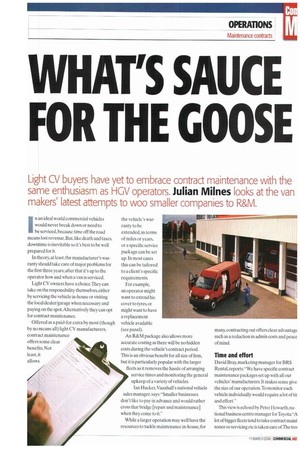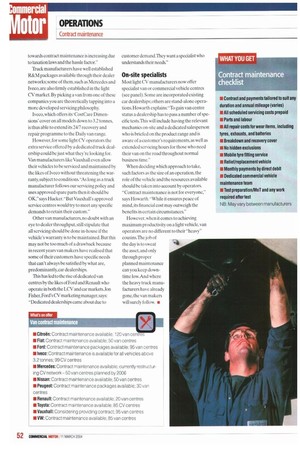WHAT'S SAUCE FOR THE GOOSE
Page 51

Page 52

If you've noticed an error in this article please click here to report it so we can fix it.
In an ideal world commercial vehicles would never break down or need to be serviced, because time off the road means lost revenue. But. like death and taxes, downtime is inevitable so it's best to be well prepared for it.
In theory, at least, the manufacturer's warranty should take care of major problems for the first three years; after that it's up to the operator how and when a van is serviced.
Light CV owners have a choice.They can take on the responsibility themselves, either by servicing the vehicle in-house or visiting the local dealer/garage when necessary and paying on the spot.Alternatively they can opt for contract maintenance.
Offered as a paid-for extra by most (though by no means all) light CV manufacturers. contract maintenance offers some clear benefits. Not least, it the vehicle's warranty to be extended, in terms of miles or years, or a specific service package can be set up. In most cases this can be tailored to a client's specific requirements.
For example, an operator might want to extend his cover to tyres, or might want to have a replacement vehicle available (see panel).
An R&M package also allows more accurate costing as there will be no hidden costs during the vehicle's contract period. This is an obvious benefit for all size of firm, but it is particularly popular with the larger fleets as it removes the hassle of arranging service times and monitoring the general upkeep of a variety of vehicles.
Ian Hucker.Vauxhall's national vehicle sales manager,says:"Smaller businesses don't like to pay in advance and would rather cross that bridge [repair and maintenance] when they come to it."
While a larger operation may well have the resources to tackle maintenance in-house, for many,contracting out offers clear advantage such as a reduction in admin costs and peace of mind.
Time and effort David Bray. marketing manager for BRS Rental, reports: "We have specific contract maintenance packages set up with all our vehicles' manufacturers. It makes sense give the size of our operation.To monitor each vehicle individually would require a lot of tir and effort.
This view is echoed by Peter Howarth, national business centre manager for Toyota:"A lot of bigger fleets tend to take contract maint nance so servicing etc is taken care ofThe tret towards contract maintenance is increasing due to taxation laws and the hassle factor."
Truck manufacturers have well established R&M packages available through their dealer networks; some of them, such as Mercedes and Iveco, are also firmly established in the light CV market. By picking a van from one of these companies you are theoretically tapping into a more developed servicing philosophy.
lveco, which offers its 'CostCare Dimensions' cover on all models down to 3.2 tonnes, is thus able to extend its 24/7 recovery and repair programme to the Daily van range.
However, forsome light CV operators the extra service offered by a dedicated truck dealership could be just what they're looking for. Van manufacturers like Vauxhall even allow their vehicles to be serviced and maintained by the likes of Iveco without threatening the warranty, subject to conditions. "As long as a truck manufacturer follows our servicing policy and uses approved spare parts then it should be OK," says Hucker."But Vauxhall's approved service centres would try to meet any specific demands to retain their custom."
Other van manufacturers, no doubt with an eye to dealer throughpuLstill stipulate that all servicing should be done in-house if the vehicle's warranty is to be maintained. But this may not be too much of a drawback because in recent years van makers have realised that some of their customers have specific needs that can't always be satisfied by what are, predominantly, car dealerships.
This has led to the rise of dedicated van centres by the likes of Ford and Renault who operate in both the LCV and car markets. Jon Fisher,Ford's CV marketingrnanager,says: "Dedicated dealerships came about due to On-site specialists customer demand:They want a specialist who understands their needs."
Most light CV manufacturers now offer specialist van or commercial vehicle centres (see panel). Some are incorporated existing car dealerships: others are stand-alone operations. Howarth explains: "To gain van centre status a dealership has to pass a number of specific tests:This will include having the relevant mechanics on-site and a dedicated salesperson who is briefed on the product range and is aware of a customer's requirements.as well as extended servicing hours for those who need their van on the road throughout normal business time."
When deciding which approach to take, such factors as the size of an operation, the role of the vehicle and the resources available should be taken into account by operators. "Contract maintenance is not for everyone," says Howarth. "While it ensures peace of mind, its financial cost may outweigh the benefits in certain circumstances."
However, when it comes to achieving maximum productivity on a light vehicle, van operators are no different to their"heavy" cousins.The job of the day is to sweat the asset, and only through proper planned maintenance can you keep downtime low.And where the heavy truck manufacturers have already gone, the van makers will surely follow. a
































































































































































































